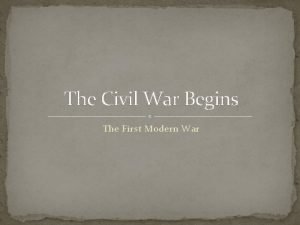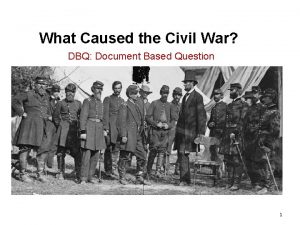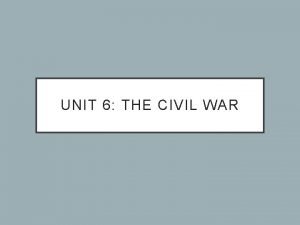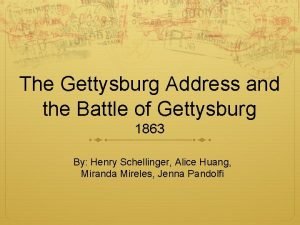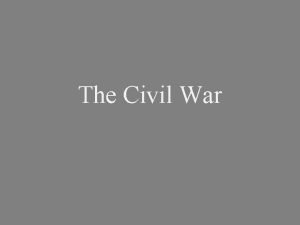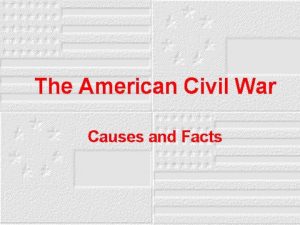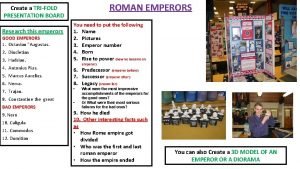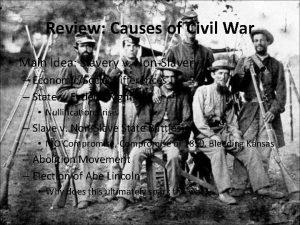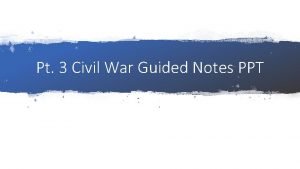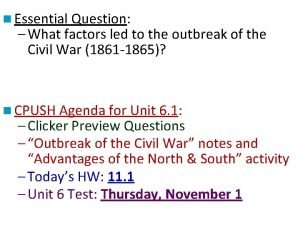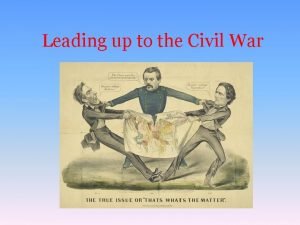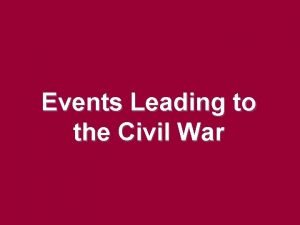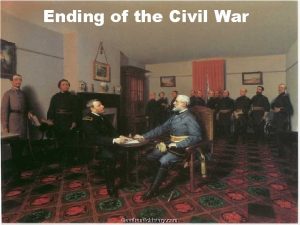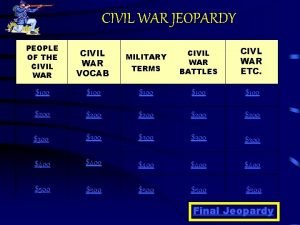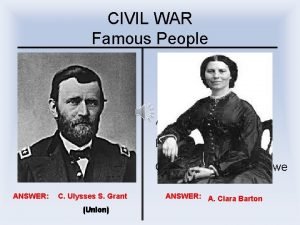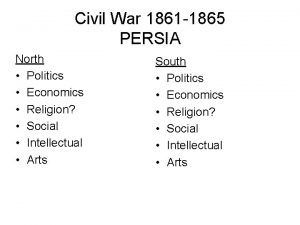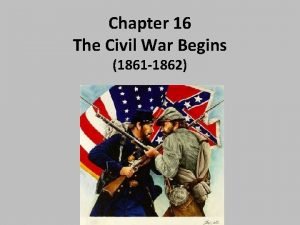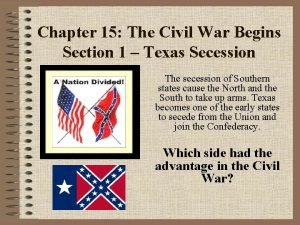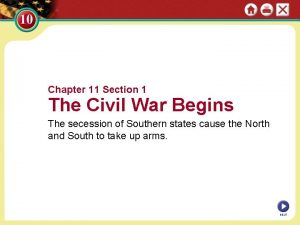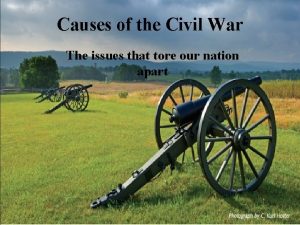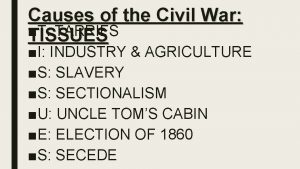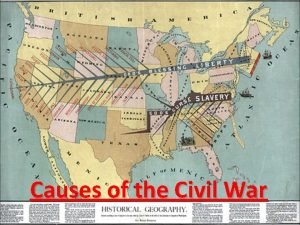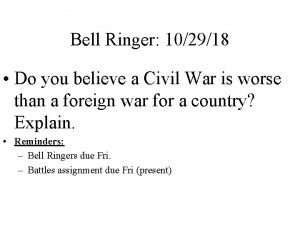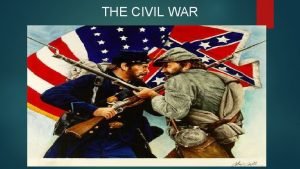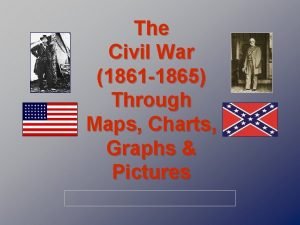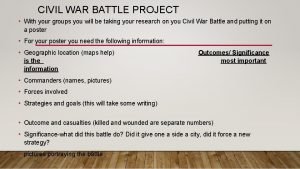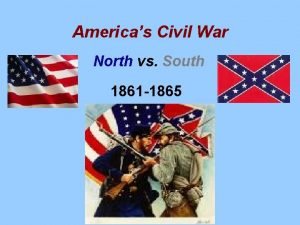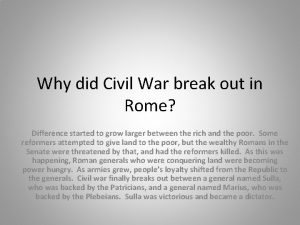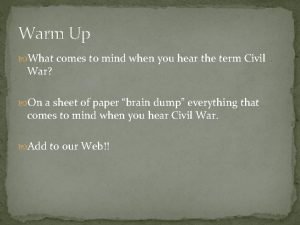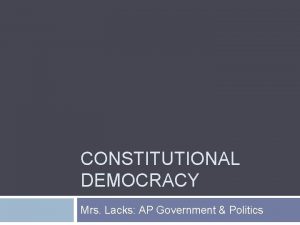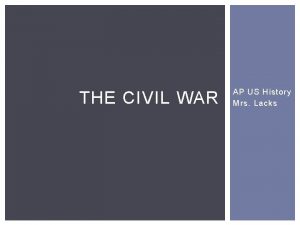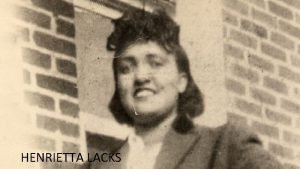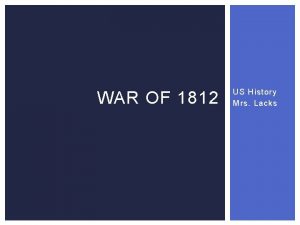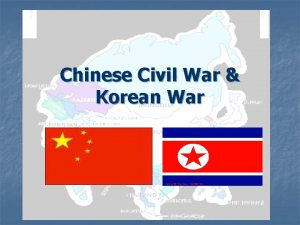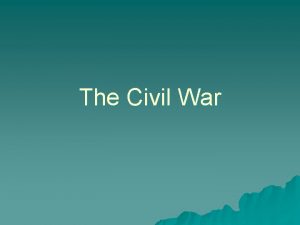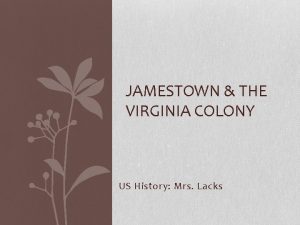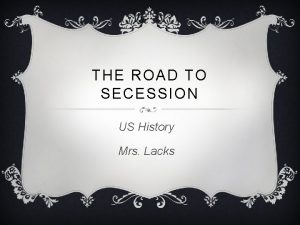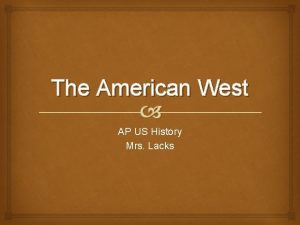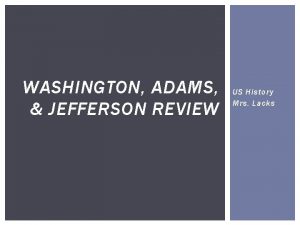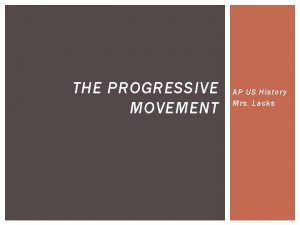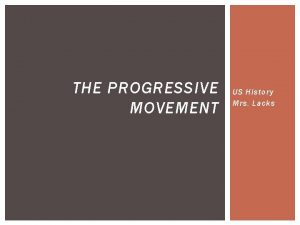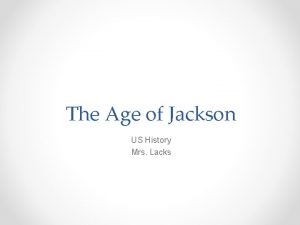CIVIL WAR POLITICS AP US History Mrs Lacks

























































- Slides: 57

CIVIL WAR POLITICS AP US History: Mrs. Lacks

The CSA • December 20, 1860 - South Carolina seceded • After SC left, Georgia, Florida, Alabama, Mississippi, Louisiana, and Texas did too • Together, they formed the Confederate States of America (aka the CSA, the Confederacy) • Original capitol: Montgomery, Alabama


The CSA • Government set up like US, but with more rights to individual states (a confederacy, like US under Articles of Confederation) • Executive Branch • President: Jefferson Davis (former US Senator from Mississippi) • VP: Alexander Stephens • Cabinet • Congress: House & Senate (representation + equality) • Judiciary


Jefferson Davis: Bio • 1808 – 1889 • Born in Kentucky • Married: Sarah Knox Taylor, then Varina Howell (6 kids) • Served in Mex-Am War • Democrat • US Rep from Miss • US Senate from Miss • US Secretary of War • 1 st and only President of the CSA (resigned from US Senate when Miss seceded and was elected without opposition)

Jefferson Davis: Beliefs • slavery • should not extend to any new territories added to the CSA • Will die out eventually in South • Who does this sound like?

Jefferson Davis: Goals • Southerners believed there would be no war • Davis feared otherwise • 1 st goal: to establish peace between USA and CSA

Fort Sumter

Lincoln’s Dilemma • Admit the CSA is a legitimate nation and leave OR refuse to admit this, and send in supplies/declare war? • Lincoln’s decision - not surrender nor reinforce the fort but merely send in “food for hungry men” (put the ball in Davis’ court)

Davis’s Dilemma • Do nothing and hurt image of confederacy as an independent nation OR order the attack to show that the confederacy was a new nation, separate from the US • Davis decision – order the attack

Fort Sumter • Confederate attack started at 4: 30 am on April 12, 1861 • the attack lasted 34 hours until Anderson (US) surrendered the fort

Fort Sumter: Results • No casualties • South wins/North leaves • 4 more states secede • Lincoln calls for troops (implements the draft in the North)

Lincoln sends troops South


Virginia • seceded on April 17 th, 1861 • most heavily populated state in the south and the most industrialized in the south with iron works and navy yard • sight of 2 nd Confederate capital - Richmond • western counties of VA seceded from VA and rejoined the union as WV in 1863 (remained a slave state)

The CSA • 11 states, 9 million people (including 3. 5 million slaves) • Army: about 600, 000 – 1, 500, 000 • Navy: no real navy

The USA • • • President: Abraham Lincoln 23 states, 22 million people Army: 2, 128, 948 total Navy: 42 ships in 1861; 671 ships in 1864 Capital: Washington DC

Abraham Lincoln • 1809 – 1865 • Born in Kentucky • Married to Mary Todd; 4 boys (only 1 will live to adulthood) • Lawyer, 1 term US Rep from Illinois’ 7 th district • Party: Whig then Republican (1 st Rep POTUS) • Elected POTUS twice: 1860; 1864

Abraham Lincoln: Goals • Original goal: keep the union together • Refused to recognize that the South had left • Did not make emancipation a goal until the North won a significant battle (Gettysburg)

The Border States • Crucial to Union cause; sent 300, 000 soldiers to the Union Army • “Mountain white” population in South sent 50, 000 soldiers to the North. • Lincoln: Hoped to have God on his side but he had to “have Kentucky. ” • War began with slaveholders on both sides; not freesoil vs. slavery

The Border States • Lincoln used force at times to maintain control of border states • Declared martial law in Maryland in certain areas and sent troops since some Marylanders threatened to cut off Washington, D. C. from the North. • Troops also sent to W. Virginia and Missouri where a mini-Civil War raged.

The Border States • Politically, Lincoln had to keep border states in mind when making public statements • Declared the primary purpose of the war was to preserve the Union at all costs • Declared the North was not fighting to free the slaves. • Emancipation edict would have driven the border states to the South • Lincoln heavily criticized by abolitionists who saw him as a sell-out.

Lincoln on Aug. 22, 1862 to Horace Greeley: “My paramount object is to save the Union, and is not either to save or destroy slavery. . . If I could save the Union without freeing any slave I would do it, and if I could save it by freeing all the slaves I would do it, and if I could save it by freeing some and leaving others alone, I would also do that. ”

Civil War ADVANTAGES, DISADVANTAGES, & STRATEGY

Advantages Union Confederacy Superior leadership of Lincoln Outstanding generals Larger population Military power Industrial power Greater wealth More railroads Controlled shipping Strong military tradition Strong motivation Fighting on home ground Skilled with guns and horses Cotton could be exchanged for supplies

Disadvantages Union Confederacy Weak motivation Leadership of Davis Non-aggressive officers Inflation (using new currency Far from home base 3, 500 -mile enemy coastline to blockade Vast enemy territory to cover Inferior numbers in men, money, and machinery State sovereignty did not work during war

Railroad Lines, 1860

Resources: North & the South

Men Present for Duty in the Civil War

Additional Confederate Assets • Advantage of a defensive war strategy: only needed a stalemate, not outright victory; fewer troops could defend a larger invading Northern army. • North had to invade, conquer, occupy and reintegrate the South into the Union. • Until emancipation proclamations of 1862 & 1863, many felt South had superior moral cause, slavery notwithstanding. • Fought for self-determination, its culture, its homeland & freedoms

Confederate Chances for Victory • A. Lack of significant industrial capacity a crucial disadvantage • B. As the war dragged on, severe shortages of shoes, uniforms, and blankets adversely impacted Rebel soldiers. • C. Railroads were cut or destroyed by the Union Army. • D. Confederates might have won if: • 1. border state seceded • 2. upper Mississippi Valley states turned against the Union • 3. Northern public opinion demanded a peace treaty (e. g. the “Copperheads”) • 4. England & France broke the Union blockade and recognized the Confederacy. • E. South didn't end up getting much-needed foreign intervention

Overview of the North’s Civil War Strategy: Anaconda Plan

Anaconda Plan • Northern strategy for war - 3 parts • 1. blockade southern ports preventing exporting of cotton or importing of manufactured goods • 2. move union river boats and army down Mississippi River splitting confed. in half • 3. capture confederate capital at Richmond, VA


Civil War THE GENERALS

Lincoln’s Generals Winfield Scott Irwin Mc. Dowell Joseph Hooker Ambrose Burnside Ulysses S. Grant George Meade George Mc. Clellan

George Mc. Clellan • 1 st General of Union Army (1861 & 1862) • chose to lead good administrator, popular with troops, incredibly cautious • fired after Battle of Antietam

Mc. Clellan: I Can Do It All!

Ulysses S. Grant • Born in Ohio as Hiram U. Grant • graduate of West Point • fought in the Mexican War • resigned from army and failed at several business ventures; tried farming/owned slaves in Missouri • Returned to the army; led troops in the West (TN, MS), and came to VA when called by Lincoln • Became last Union general of the Civil War

William Tecumseh Sherman • Leads “March to Sea” through Georgia and the Carolinas • Burns Atlanta • "General Grant is a great general. I know him well. He stood by me when I was crazy, and I stood by him when he was drunk; and now, sir, we stand by each other always. "

Confederate Generals “Stonewall” Jackson Nathan Bedford Forrest Jeb Stuart George Pickett James Longstreet Robert E. Lee

Robert E. Lee • • • Virginian, born in Stafford, lived in Arlington modest, willing to take chances, great soldier West Point graduate fought in war with Mexico Married Mary Custis (granddaughter of George Washington) led the group of Marines in capturing John Brown Disagreed with slavery turned down an offer to lead in the Union army when VA seceded (loved Virginia & the South) Ironically, opposed to slavery and spoke against secession in Jan. 1861

Robert E. Lee • Considered the greatest general in American History (other than GW) • Loved by his men, respected by Grant • Went on to work at Washington College in Lexington after the war (now Washington & Lee University)

• Virginian • Graduated from West Point • Fought in Mexican-American War • Taught at Virginia Military Institute (VMI), Lexington, VA • stood “like a stone wall” in battle • Loved by his troops • leader in confederate victory at Bull Run • Shot accidentally by his own men at Battle of Chancellorsville • Buried in Lexington, VA (statue at VMI salutes Robert E. Lee – also buried here) Thomas Jonathan “Stonewall” Jackson

Civil War RAISING ARMIES: NORTH & SOUTH

Northern Troops • Initially volunteers • 1863 – first federal conscription law (ever) • https: //www. youtube. com/watc h? v=LOFILwsi. LCc (Northern reaction) • Could buy your way out ($300) • Hated in Democratic strongholds • New York Draft Riot (1863) – sparked by Irish Americans against blacks • About 200, 000 deserters of all classes • Irish: https: //www. youtube. com/watch ? v=ns-qtoxn. AS 8

Northern Troops • About 180, 000 blacks served (10% of total enlistment) • Black volunteers initially rejected – North didn’t allow blacks to fight until EP (1863) • Blacks served in segregated units and rarely saw combat • 54 th Massachusetts – first all black regiment to receive the Medal of Honor (Glory)

Southern Troops • Initially relied on volunteers • Forced to conscript men by 1862 • Rich men could hire substitutes or purchase exemption • Did not recruit slaves until a month before the war ended • African Americans did fight for the South; thousands of slaves built fortifications/trenches, etc. • Slaves kept Southern farms going while white men fought • Ironically, did not revolt after EP – most stayed on farms even after war

Southern Troops • Most of the Five Civilized Tribes sided with the Confederacy including Cherokees, Creeks, Choctaws, Chickasaws, and Seminoles

Civil War EUROPEAN DIPLOMACY

European Diplomacy • Aristocracies of England, France, Austria-Hungary, etc. (except Russia) supported the Confederate cause. • Europeans sold weapons, warships and supplies to the Confederates. • At times, considered direct intervention on behalf of South, especially Britain. • British industrial & commercial centers wanted an independent Confederacy • Wanted safe cotton supply without Union’s blockade or interference • British shippers & manufacturers could bypass Union tariffs.

King Cotton Failed the South • Lincoln made the war a moral issue with EP (1863) • Working people in England & France became vocal about their disapproval of slavery • As Union armies captured the South, they stole the cotton and sold it to England • Booming war industries in England that supplied the North and South alleviated British unemployment • Huge amounts of northern grain shipped to Britain (had suffered through bad harvests)

British Diplomacy • Trent Affair (1861) • Britain served as an unofficial Confederate naval base until 1863 • Laird & Sons Co. and their iron rams RMS Trent CSS Alabama

French Diplomacy • French leader, Napoleon III, treated Union with contempt • Sent troops to conquer Mexico (1863) – violation of the Monroe Doctrine • US was very cautious – didn’t want a world war • After Civil War, Sec of State Seward prepared to send US forces to drive French out of Mexico (Napoleon leaves, Mexico regains independence)

Civil War FINANCIAL ASPECTS

Lincoln’s administration and the Republican Party created one of the most successful economic programs in American history (after the South seceded): • Pacific Railway Act (1863)created the transcontinental railroad by 1869 • Homestead Act (1862) opened millions of acres of land for free to pioneers • Morrill Tariff (1861) raised tariffs—a trend that continued until the 20 th century and became a dominant issue in politics during much of the post-Civil War era. • National Banking Act (1862) created a new national bank that would last until 1913 • Morrill Land Grant Act (1862) resulted in agricultural and mechanical colleges in the west • First federal income tax in U. S. history (although ended after the war)
 Civil war first modern war
Civil war first modern war Toward civil war lesson 3 secession and war
Toward civil war lesson 3 secession and war The immortal life of henrietta lacks table of contents
The immortal life of henrietta lacks table of contents Necessities lacks and wants
Necessities lacks and wants Howard jones henrietta lacks
Howard jones henrietta lacks Polio
Polio Jose rizal propaganda
Jose rizal propaganda The immortal life of henrietta lacks discussion questions
The immortal life of henrietta lacks discussion questions Rhea lacks temerity so she definitely would not
Rhea lacks temerity so she definitely would not Work on the production line is monotonous and lacks
Work on the production line is monotonous and lacks Organism whose cells contain a nucleus
Organism whose cells contain a nucleus They are mrs garcia and mrs castro
They are mrs garcia and mrs castro They are mrs garcia and mrs castro
They are mrs garcia and mrs castro Mrs. darling was ___________ of mrs. s.
Mrs. darling was ___________ of mrs. s. Civil rights and civil liberties webquest
Civil rights and civil liberties webquest What caused the civil war dbq
What caused the civil war dbq Civil war map activity
Civil war map activity Shermans neckties
Shermans neckties Gtech gettysburg
Gtech gettysburg Timeline of the english civil war
Timeline of the english civil war What led to the civil war
What led to the civil war Civil war facts
Civil war facts Civil war staar questions
Civil war staar questions Trifold presentation
Trifold presentation Conclusion of the civil war
Conclusion of the civil war Civil war ppt and guided notes
Civil war ppt and guided notes Cotton diplomacy
Cotton diplomacy What led to the civil war
What led to the civil war Civil war trading cards project
Civil war trading cards project Unit 4: civil war and reconstruction
Unit 4: civil war and reconstruction What events led to the civil war
What events led to the civil war Civil war map sherman's march to the sea
Civil war map sherman's march to the sea The civil war affected the northern economy by
The civil war affected the northern economy by Civil war and reconstruction study guide
Civil war and reconstruction study guide Causes of the civil war jeopardy
Causes of the civil war jeopardy Civil war jeopardy review game
Civil war jeopardy review game Famous people of the civil war
Famous people of the civil war Civil war advantages and disadvantages chart
Civil war advantages and disadvantages chart Civil war resumes
Civil war resumes Chapter 16 the civil war begins worksheet answers
Chapter 16 the civil war begins worksheet answers States rights
States rights Site:slidetodoc.com
Site:slidetodoc.com What were the 4 main causes of the civil war
What were the 4 main causes of the civil war Tissues causes of civil war
Tissues causes of civil war Northwest ordinance lead to civil war
Northwest ordinance lead to civil war Civil war bell ringers
Civil war bell ringers The turning point of the civil war
The turning point of the civil war The civil war
The civil war Who were abolitionists
Who were abolitionists North and south states civil war
North and south states civil war Aftershock beyond the civil war
Aftershock beyond the civil war The civil war
The civil war Civil war battle project
Civil war battle project Civil war vocabulary list
Civil war vocabulary list What are the 3 main causes of the civil war
What are the 3 main causes of the civil war North and south states civil war
North and south states civil war Why did civil war break out in rome?
Why did civil war break out in rome? English civil war mind map
English civil war mind map
